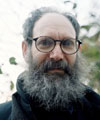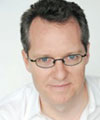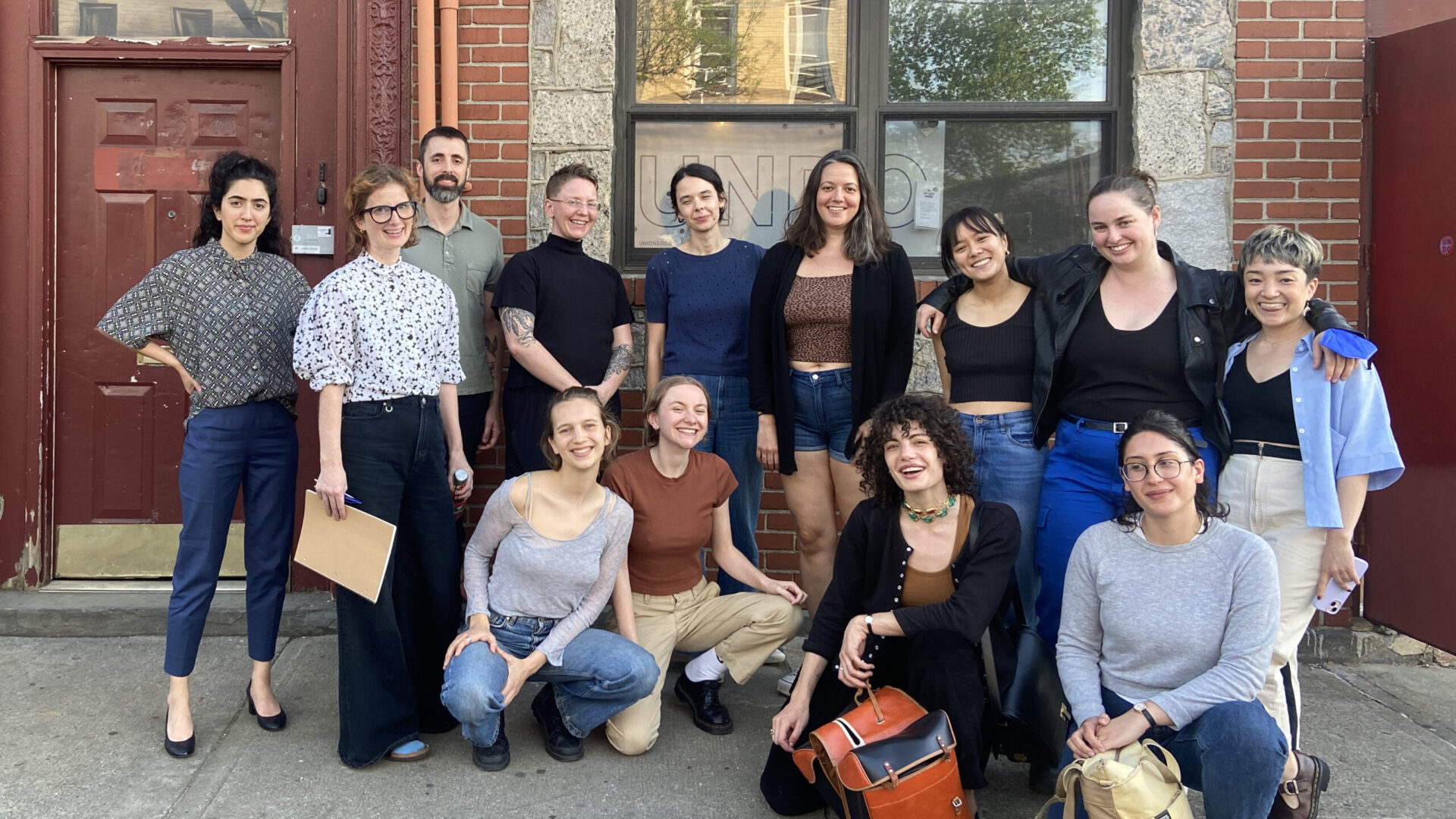Ed: I agree with you but I think that one of the interesting things about documentary is that it can push the narrative form—it can take apart the narrative form with greater than we normally, most people will accept in a narrative form. Meaning that you can have a documentary that is only about character, that has barely a story but is mostly about just exploring a character. While there are fiction films that do that, documentaries can reach a much wider audience while doing that than those same kind of fiction films usually do. That’s what’s interesting. We’re into the reality aspect of the documentary, and therefore we’ll put up, often, with more formal invention, than most people will with their stories. I think so. I think that documentary—Michael Moore, for all you said, he’s really formally inventive in a way that most of our feature films are not. That’s not talking about his journalistic ethics or anything like that. But just that he plays with the form. He’s doing essay forms that reach millions of people. That’s kind of interesting if you think about it that way.
Lisa: Well, objectively.
Ed: Yeah, I mean, aside from his content or whatever.
Richard: Well, Glenn Beck or Rush Limbaugh are doing essay books that are reaching large audiences. So, numbers don’t mean anything. They’re doing essays. So, Rush Limbaugh is doing essay. And, to think of an essay writer of great sophistication—
Lisa: Didion.
Richard: Joan Didion. Well, she reaches large audiences too. Not necessarily anymore. Wolfgang Schivelbusch is writing essays, he’s writing essays that are published, but they’re not reaching huge audiences. But they’re fascinating. But the point is the fact that he’s doing an essay doesn’t make it intrinsically meritorious.
Ed: No, but it is interesting that that form that normally does not reach a wide audience does through that he’s doing that. I find that interesting. If you don’t find that interesting, that’s fine. But I find it interesting.
Colin: There’s a history of written essay reaching wide audiences, but Chris Marker never had the kind of audience that Joan Didion did.
Aaron: To answer one of your original questions, I think an appreciation for non-fiction filmmaking is kind of stretched across the board here, but as far as specializing, I don’t know how much that would really add. Other than if there were someone like Richard who just happened to have more education on a certain topic, to use the phrase ‘the antennas go up’ and I want to read him about something specifically. I want critics to be more well-rounded. I want them to see everything. I want them to see highbrow and low, I want them to see the trash too, so that they have some sort of context. Ed also mentioned that now is a time when people have so much greater access to the history of cinema, but I also think that along those lines and with bloggers and just so many more voices, now we have too much media. Now we need individual people to kind of reach through this sea we’re drowning in of media and pointing people to the right direction.
Because there is just so much media out there, film is no longer competing with just film. It’s no longer just about, What are you going to go see Friday night? It’s about, What are you gonna watch on Youtube? What are you gonna Bit Torrent? What video game are you gonna play? There’s so much more out there. It would be great if documentaries of all kinds were written about more to give people a chance to try to see these things so they didn’t just get lost on the festival circuit.
Thom: One of the problems of the generalist critic when it comes to approaching documentary or when it comes to approaching experimental film, is as a generalist trying to keep up on what’s happening in international cinema, you don’t have enough hours in the day. You couldn’t step forward with the same expertise on Chinese cinema unless you watch a lot of Chinese cinema, and what my essay was partly driven by was seeing so many generalist critics who will make pronouncements about documentaries and they’ve seen a couple dozen in a year, often without the sense of history that Ed was talking about. I think that where there is real room for some people to fill a hole. I think it’s an opportunity out there, because I think there are people who want this stuff. We have a room full of people on a beautiful sunny afternoon who are talking about this. I see theatres all over the country in towns as small as Columbia, MO, filling up for documentary film festivals.
Aaron: I agree with that, I just don’t want to force the issue. If somebody’s passionate about that, and that’s what they wanna do, and that’s what excites them—
Thom: I wasn’t thinking about compulsory… [laughter]
Aaron: I just want to see more balance is all, in even those writers. I think that they need to be able to know, not just from documentary to documentary, but changes in documentary filmmaking.
Ed Purchase : You’re contradicting yourself Aaron, because on one level you’re saying that there’s this deluge of media that no one person could possibly follow, and also we need critics to guide us. But then, how are those critics gonna follow it all? Why try? I like a critic with some bias. I like critics where I can say, This person’s into that. I know this is where they’re coming from. Those are the critics that I’m most interested in because I know they have a certain take on things, and I might not agree with that but l learn from pivoting off that knowledge.
Lisa: Yeah, but having a beat and having a bias are super different.
Ed: That’s… yeah.
Pills Lisa: They’re super, super different. Having a beat is, this is the area I write about. Having a bias is having a voice. Any critic worth his or her salt has a voice. Like, a specific set of criteria. You know there are certain movies, like I know there are certain movies Roger Ebert’s gonna love that I’m gonna roll my eyes over, and that’s the deal. And that’s how you develop a readership. And that’s how people bother to listen to X or Y. They may not even agree with them, but they know enough about their perception of film that they know where they’re gonna stand in relation to it. And they’re gonna enjoy reading them also, which I think is still important.
Audience member : For instance, Ken Burns has done some on the history of baseball, the Civil War. What’s the liability of documentaries on a particular topic, and for those out there that are trying to make one on the history of sport, cricket, soccer, what’s the key to—I mean, the Ken Burns effect, we all know, making a moving image of the still photo. Is there any suggestion or advice to avoid any pitfalls and try to make a compelling documentary on the history of a topic or a sport or something like that?
Richard: Make sure that beloved old people participate. [laughter]
Thanks to Laura Starecheski and Colin Beckett for their help with this transcript.
DOCUMENTARY CRITICISM PANELISTS BIOGRAPHIES:
 Richard Brody is the movie listings editor at The New Yorker, where he writes film reviews, a DVD column, and the blog The Front Row; among his publications there are articles about François Truffaut, Jean-Luc Godard, Samuel Fuller, and Wes Anderson. He is the author of “Everything Is Cinema: The Working Life of Jean-Luc Godard”, published in 2008 by Metropolitan Books.
Richard Brody is the movie listings editor at The New Yorker, where he writes film reviews, a DVD column, and the blog The Front Row; among his publications there are articles about François Truffaut, Jean-Luc Godard, Samuel Fuller, and Wes Anderson. He is the author of “Everything Is Cinema: The Working Life of Jean-Luc Godard”, published in 2008 by Metropolitan Books.
 Ed Halter is a critic and curator living in New York City. His writing has appeared in Artforum, Arthur, The Believer, Cinema Scope, Kunstforum, Millennium Film Journal, Moving Image Source, Rhizome, The Village Voice and elsewhere, and he is a 2009 recipient of the Creative Capital | Warhol Foundation Arts Writers Grant. From 1995 to 2005, he programmed and oversaw the New York Underground Film Festival, and has organized screenings and exhibitions for the Brooklyn Academy of Music, Cinematexas, Eyebeam, the Flaherty Film Seminar, the Museum of Modern Art, and San Francisco Cinematheque. He currently teaches in the Film and Electronic Arts department at Bard College, and has lectured at Harvard, NYU, Yale, and other schools as well as at Art in General, Aurora Picture Show, the Foundation for Art and Creative Technology, the Images Festival, the Impakt Festival, and Pacific Film Archive. His book From Sun Tzu to Xbox: War and Video Games was published in 2006. With Andrea Grover, he is currently editing the collection A Microcinema Primer: A Brief History of Small Cinemas. He is a founder and director of Light Industry, a venue for film and electronic art in Brooklyn, New York.
Ed Halter is a critic and curator living in New York City. His writing has appeared in Artforum, Arthur, The Believer, Cinema Scope, Kunstforum, Millennium Film Journal, Moving Image Source, Rhizome, The Village Voice and elsewhere, and he is a 2009 recipient of the Creative Capital | Warhol Foundation Arts Writers Grant. From 1995 to 2005, he programmed and oversaw the New York Underground Film Festival, and has organized screenings and exhibitions for the Brooklyn Academy of Music, Cinematexas, Eyebeam, the Flaherty Film Seminar, the Museum of Modern Art, and San Francisco Cinematheque. He currently teaches in the Film and Electronic Arts department at Bard College, and has lectured at Harvard, NYU, Yale, and other schools as well as at Art in General, Aurora Picture Show, the Foundation for Art and Creative Technology, the Images Festival, the Impakt Festival, and Pacific Film Archive. His book From Sun Tzu to Xbox: War and Video Games was published in 2006. With Andrea Grover, he is currently editing the collection A Microcinema Primer: A Brief History of Small Cinemas. He is a founder and director of Light Industry, a venue for film and electronic art in Brooklyn, New York.
 Thom Powers is the creator of the documentary series Stranger Than Fiction that takes place at the IFC Center. Now in its 13th season, STF has featured guests such as Jonathan Demme, Albert Maysles, and Barbara Kopple. Powers also serves as the documentary programmer for the Toronto International Film Festival (TIFF) where he has presented world premieres such as “Art of the Steal,” “Food, Inc,” and “Encounters at the Edge of the World.” He has taught at New York University SCPS for 10 years. He co-founded the Cinema Eye Honors, an annual award for documentary excellence; and the Garrett Scott Development grant for first time filmmakers. He has directed documentaries for HBO, PBS and Sundance Channel. His essay “Wanted: Documentary Critics” was published in 2008 on www.STFdocs.com. He is also setting up DOC NYC with his partner Raphaela Neihausen, a festival of nonfiction storytelling kicking off in November.
Thom Powers is the creator of the documentary series Stranger Than Fiction that takes place at the IFC Center. Now in its 13th season, STF has featured guests such as Jonathan Demme, Albert Maysles, and Barbara Kopple. Powers also serves as the documentary programmer for the Toronto International Film Festival (TIFF) where he has presented world premieres such as “Art of the Steal,” “Food, Inc,” and “Encounters at the Edge of the World.” He has taught at New York University SCPS for 10 years. He co-founded the Cinema Eye Honors, an annual award for documentary excellence; and the Garrett Scott Development grant for first time filmmakers. He has directed documentaries for HBO, PBS and Sundance Channel. His essay “Wanted: Documentary Critics” was published in 2008 on www.STFdocs.com. He is also setting up DOC NYC with his partner Raphaela Neihausen, a festival of nonfiction storytelling kicking off in November.
 Lisa Rosman is a former labor organizer, and now writes the Indiewire film and television blog New Deal Sally. Her work regularly appears in Time Out New York, Salon.com, usmagazine.com, and IFC.com, and she previously served as the Flavorpill film editor from 2005-2009, the Brooklyn Rail film editor from 2003-2005, and the mistress of the film blog The Broad View from 2005-2008. She also has served as the official blogger for Roger Ebert’s Overlooked Film Festival since 2006 and has commented on TNT, the IFC, PBS and NPR. Most notably, she once served as an assistant for Elmo on Sesame Street.
Lisa Rosman is a former labor organizer, and now writes the Indiewire film and television blog New Deal Sally. Her work regularly appears in Time Out New York, Salon.com, usmagazine.com, and IFC.com, and she previously served as the Flavorpill film editor from 2005-2009, the Brooklyn Rail film editor from 2003-2005, and the mistress of the film blog The Broad View from 2005-2008. She also has served as the official blogger for Roger Ebert’s Overlooked Film Festival since 2006 and has commented on TNT, the IFC, PBS and NPR. Most notably, she once served as an assistant for Elmo on Sesame Street.
 Aaron Hillis is Vice-President of the boutique label Benten Films, the editor of GreenCine Daily, and a regular contributor to The Village Voice, LA Weekly, IFC, and Time Out New York. His co-directorial feature debut, Fish Kill Flea, played at UnionDocs in 2007.
Aaron Hillis is Vice-President of the boutique label Benten Films, the editor of GreenCine Daily, and a regular contributor to The Village Voice, LA Weekly, IFC, and Time Out New York. His co-directorial feature debut, Fish Kill Flea, played at UnionDocs in 2007.
 Karin Chien is an independent film producer based in New York City, and the recipient of the 2010 Piaget Producers Award from the Independent Spirit Awards. Karin has produced seven feature-length films, including THE EXPLODING GIRL (2009), THE MOTEL (2005) and ROBOT STORIES (2002), which have won over 75 festival awards, premiered at Sundance and Berlin, and received international distribution. Karin is currently in post-production on two Sundance Filmmaker Lab projects, CIRCUMSTANCE and AYITI, AYITI, and in pre-production on Bradley Rust Gray’s JACK & DIANE. Karin is the president and founder of dGenerate Films, the leading distributor of independent, uncensored Chinese cinema. Karin is also the curator of the Chinatown Film Project, an inaugural film exhibition for the Museum of Chinese in America.
Karin Chien is an independent film producer based in New York City, and the recipient of the 2010 Piaget Producers Award from the Independent Spirit Awards. Karin has produced seven feature-length films, including THE EXPLODING GIRL (2009), THE MOTEL (2005) and ROBOT STORIES (2002), which have won over 75 festival awards, premiered at Sundance and Berlin, and received international distribution. Karin is currently in post-production on two Sundance Filmmaker Lab projects, CIRCUMSTANCE and AYITI, AYITI, and in pre-production on Bradley Rust Gray’s JACK & DIANE. Karin is the president and founder of dGenerate Films, the leading distributor of independent, uncensored Chinese cinema. Karin is also the curator of the Chinatown Film Project, an inaugural film exhibition for the Museum of Chinese in America.






This is a great document of a great discussion & I want to thank UnionDocs for sharing it.
Pingback: Underground Film Links: May 22, 2011 | Bad Lit